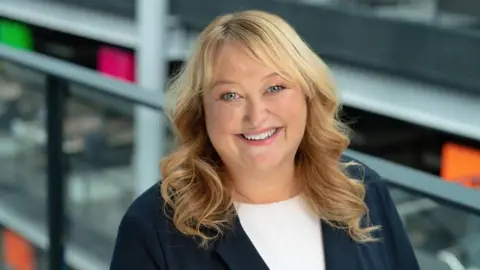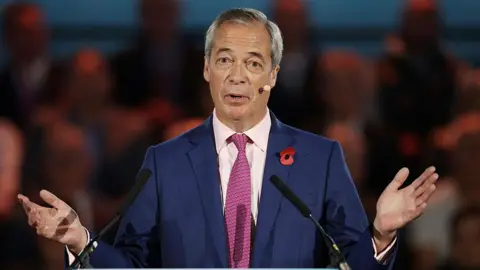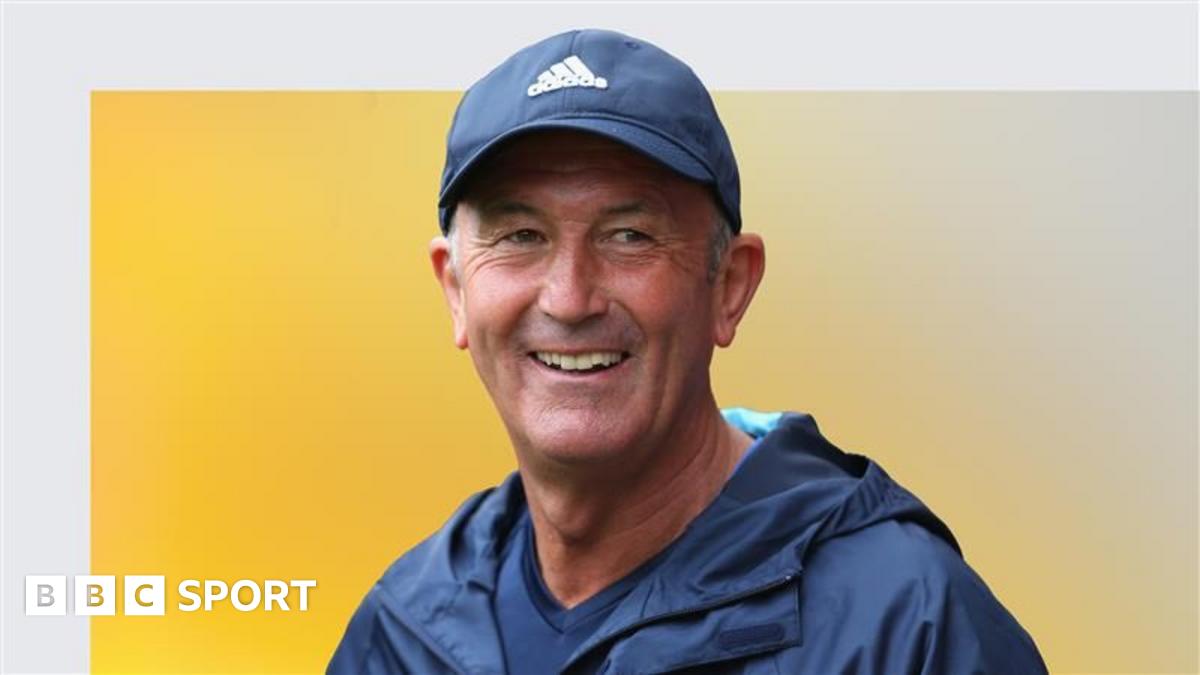Gareth LewisWales political editor

 BBC
BBC
Rhuanedd Richards, became director of Wales in 2021, and took up the interim position in June 2025
Reform UK has called for a "review into the relationship" between the BBC and Plaid Cymru.
Cai Parry-Jones, a Reform spokesman, highlighted Plaid's leader, Rhun ap Iorwerth, and director of political strategy, Aled ap Dafydd, both who previously worked for the BBC.
His comments came after Nigel Farage accused the broadcaster of left-wing bias because its interim director of nations, Rhuanedd Richards, is a former chief executive of Plaid.
Responding to Parry-Jones' comments, a BBC Wales spokesperson said: "Our news teams in BBC Wales and across the BBC are completely committed to providing our audiences with fair and impartial coverage of all relevant political parties."
Plaid Cymru did not wish to comment on the remarks.
Speaking to Newyddion S4C, Parry-Jones said ap Iorwerth had been "chief political correspondent for BBC Wales for five years", while ap Dafydd had "been in a prominent role with the BBC and S4C's Newyddion".
"I'm not saying this proves there is a institutional bias within BBC Wales for Plaid Cymru and against Reform UK, but… we need a review into this," he said.
The remarks come after the resignations of BBC director general Tim Davie and CEO of News Deborah Turness over an edit of a speech by President Donald Trump on the Panorama programme.
In a video message posted on X, Farage said: "Rhuanedd Richards was the chief executive of Plaid.
"She worked during the Labour-Plaid coalition for the government of Wales.
"She's now a director of BBC Wales, on just over £190,000 a year.
"There is living proof that, right the way through to the top, the BBC is infected with left-wing bias."
Nigel Farage has accused the BBC of left-wing bias because of the previous employment of its interim director of nations, Rhuanedd Richards
A BBC spokesperson said: "Rhuanedd Richards has worked for the BBC since 2018 and has been director of BBC Wales since 2021. She is currently interim director for the nations.
"Rhuanedd has always been open about her career history and is wholly committed to upholding the impartiality of the BBC."
Richards started her career as a journalist with BBC Wales and was Plaid's chief executive between 2011 and 2016.
She returned to the BBC in 2018, becoming director - or head of - BBC Wales in 2021.
She took up her current interim role in June this year.
Speaking in the Senedd on Tuesday afternoon, Welsh Conservative culture spokesperson Gareth Davies said that ahead of May's Senedd election it was "imperative that our public service broadcaster in Wales is politically impartial and balanced, and that we can all have confidence that BBC Wales gives balanced coverage to all political parties".
He added that it was "right" that Tim Davie and Deborah Turness had announced their resignations.
"The report by Michael Prescott uncovered a problem of institutional left wing bias in the BBC and he felt forced to leak the dossier since it was ignored by the BBC's board.
"So, it's essential that trust and accountability are restored in the BBC, and if similar problems exist at BBC Wales, that they are identified," Davies said.
In response, the Welsh government's business manager - the Trefnydd - Jane Hutt said the trust and accountability of the BBC "is absolutely crucial".
"We enjoy a very robust and strong relationship with our broadcasters here in Wales, and of course that is something that is very much important to us in terms of our democracy and our engagement as a Senedd," she said.
A spokesperson for BBC Wales said: "Our news teams in BBC Wales and across the BBC are completely committed to providing our audiences with fair and impartial coverage of all relevant political parties."

 Getty Images
Getty Images
Nigel Farage has accused the BBC of left-wing bias because of the previous employment of Rhuanedd Richards, the broadcasters interim director of Nations
Earlier, responding to Nigel Farage's accusations that the BBC was infected with a left-wing bias, Rhodri Williams, former director of Ofcom in Wales, told BBC Radio Cymru's Dros Frecwast the claims were "completely absurd and unfair".
Speaking on BBC Radio Wales Breakfast, Prof Richard Tait, from Cardiff University as well as a former governor on the BBC board, said "if you work for the BBC, people are going to look at where you previously worked".
"I think sometimes it's quite oppressive, but the reality is that if you work for BBC you do have to be able to look the audience in the eye and say 'I'm neutral in these areas'.
"It's not so much what you have done privately or what you think privately that matters, it's what you do professionally."
Mr Tait, who was also editor of BBC Newsnight and Channel 4 News and former chair of the BBC's editorial standards committee, said: "The BBC is currently under so much fire that they can't really get on the front foot.
"What they have to do is persuade the audience, who in the main is still sympathetic to them, that they genuinely take impartiality as seriously as I know they do."
.png)
 3 hours ago
1
3 hours ago
1








 English (US) ·
English (US) ·